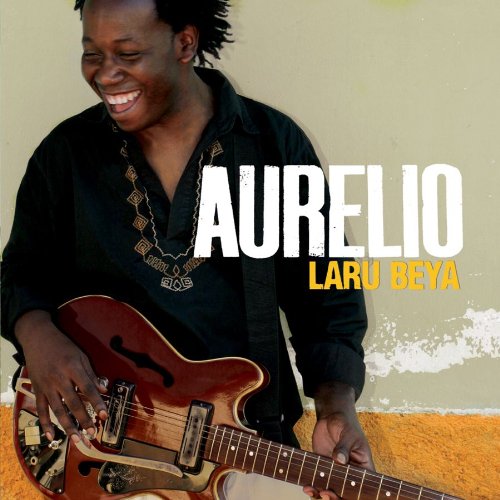
Aurelio
Laru Beya
Release Date: Jan 18, 2011
Genre(s): Latin, Pop/Rock, Central American Traditions, Honduran
Record label: Sub Pop
Music Critic Score
How the Music Critic Score works
Buy Laru Beya from Amazon
Album Review: Laru Beya by Aurelio
Great, Based on 6 Critics
Based on rating 4/5
When the remarkable album Watina was released, nearly four years ago, it launched the tragically brief international career of Andy Palacio and focused attention to the culture and history of the Garifuna community – the descendents of escaped slaves from Africa who inter-married with the indigenous people of St Vincent, and are now scattered across Central America. Palacio died within a year of the album's release, but his legacy continues in the work of Aurelio Martinez, a singer-songwriter, guitarist and traditional drummer who appeared on Watima and is also a politician in Honduras. Like Palacio's album, it's produced by guitarist Ivan Duran, and matches guitars and traditional percussion against Martinez's laidback, soulful vocals.
Based on rating 8/10
The Garifuna people have their cultural origins in the wreck of a slave ship bound from West Africa. Abandoned on the Caribbean coast of Honduras, they intermingled with the Arawak and Carib tribes and the music of the resulting community reflects just the blend of elements one might expect, along with some that might be surprising. On this album from Garifuna artist Aurelio, you'll hear Brazilian-style percussion patterns, lyrics in French and in the Garifuna language, grooves derived from reggae and rocksteady, and gorgeously layered call-and-response harmony vocals.
Based on rating 7.8/10
In 2008, Andy Palacio unexpectedly passed away. He was only 48. Just a year earlier, he had released an album called Wátina, which brought the music of his Garifuna people to its widest-ever audience. His death left a hole-- the culture of his people had lost its most prominent ambassador, as well as its most important modernizer.
Based on rating 7/10
Garifuna music is West Africa translated through the culture of Central American coastlines, but Senegal is still a long way from Honduras, and I didn’t expect to hear Youssou N’Dour duetting on the first track of Aurelio’s new album, Laru Beya. “N’Dour,” explains the album booklet, “selected [Aurelio Martinez] as his protégé in 2008, as part of the prestigious Rolex Mentor and Protégé Arts initiative.” That clarifies the presence of singers from Orchestra Baobab, rappers from Dakar and the slippery trickle of a kora in the background at the same aural level as the oot-hoo of a conch shell. Women from the Umalali compilation reappear—Sofia Blanco present of course—and so do musicians from Andy Palacio’s Wátina.
Opinion: Excellent
An impressive album that simply sounds better which each new listening. David Katz 2011 The Garifuna communities that line the Caribbean coast of Central America have their origin in a fortuitous shipwreck of 1675, which allowed enslaved Africans from what is now southeast Nigeria to escape to the island now known as Saint Vincent; there, they were initially forced to battle the resident Carib Amerindians, but later intermarried with Caribs and Arawaks, subsequently working together to repel both French and British colonisers. Then, once the British took full control of the island, in 1795, the Garifuna, known as ‘Black Caribs’, were forcibly deported to the island of Roatán, from which they migrated to Honduras, Belize, Guatemala and Nicaragua.
Opinion: Average
Honduran Aurelio takes the Garifuna mantle from his late, great mentor Andy Palacio (ACL Music Festival 2007), further evolving the musical moment an African slave ship broke free to the Caribbean. Light, coastal, airy rhythms and island cries smooth the Jimmy Cliff lilt of the title track and Wingless Angels-type chant "Ineweyu." Afro-Latin sound system "Wéibayuwa" and belly-rubbing "Wamada" frame the shake and bake. .
'Laru Beya'
is available now

